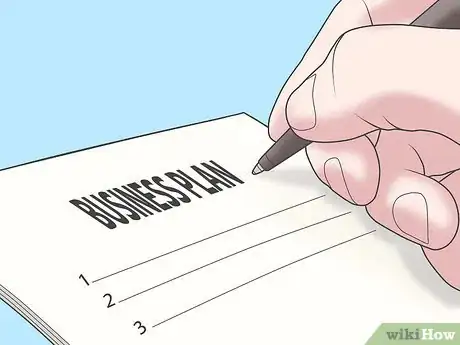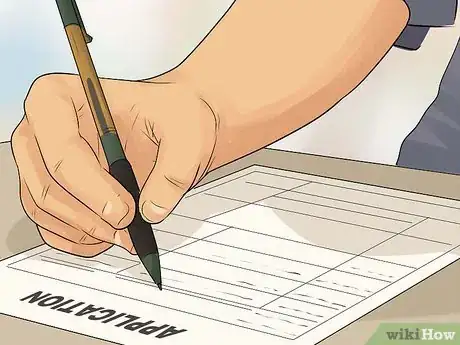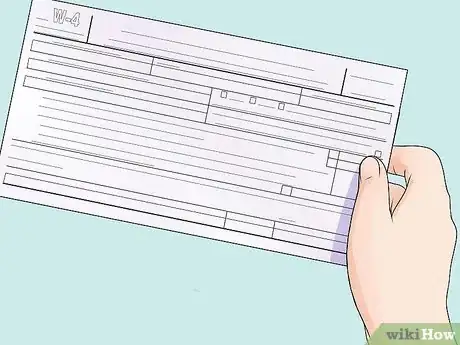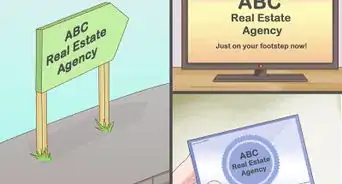This article was co-authored by Hannah Park. Hannah Park is a Licensed Real Estate Agent operating in Los Angeles, California and is a part of Keller Williams, Larchmont. She received her Real Estate Certification in 2018 from the California Bureau of Real Estate, and now specializes as a Buyer's Agent and Listing Agent.
There are 18 references cited in this article, which can be found at the bottom of the page.
This article has been viewed 57,387 times.
In any economy, there will always be people looking to buy and sell property. The real estate industry, surrounding those who conduct and facilitate these transactions, can be a lucrative field for starting and growing your own business. Being your own boss, especially in a field like real estate, will give you something interesting to do, and allow you the opportunity to set your own hours and salary.
Steps
Become a Real Estate Agent
-
1Get a bachelors degree. While becoming an agent only requires a high school diploma, the finances involved in real estate are becoming more complex. This makes brokerages less likely to hire someone without at least a bachelors degree. Plus, the information you get in these classes will help when you take coursework for licensing.[1]
- If you are interested in become a real estate agent, focus on classes in real estate, business administration, marketing, and finance. Check if your school offers courses that involve real estate law, land-use planning, ethics, and environmental issues. Additionally, you will also want to have a strong background in statistics and English.
-
2Save money. To break into the real estate business, you will need a bit of savings. Coursework, exam and licensing fees, and advertising can cost around $6,000 as you try to get started. Beyond that, it will be several months until you start to get clients and have deals to close, so you may not be getting paid as well.[2]
- One good estimate is that you will need to be able to cover six months of living expenses to account for the time when you won’t be pulling in an income.
Advertisement -
3Learn your state’s rules. Every state requires some amount of pre-licensing coursework before taking the required exams. That number varies between states, so make sure you know what your state requires before signing up for classes.
- Each state has a variety of laws involving real estate practices, licensing requirements and fees, and regulations involving commerce. Your best bet for specific information is your state’s real estate commission.
- If you live near a state border, it might be beneficial to get licenses in several states. For most states, a portion of the exam covers national real estate law, so your additional studying will only need to cover differences in state laws.[3]
-
4Take real estate classes. Every state requires a different amount of hours to qualify for the licensing exam. You may need to cover these hours in a classroom, which you can usually do through local colleges.
- While individual rules may vary by state, real estate classes taken in college can cover state requirements. If your college doesn’t have all of the required classes, you can taken them through an approved provider, which can be another college, a trade association, or other licensed on-site or correspondence schools. These other methods are useful if you are becoming a real estate agent as a second career.
- In some states, like California, you may be able to get the required hours through an online course you can complete in 2 ½ weeks, while Texas requires up to 180 classroom hours (six courses of 30 hours each). Real estate coursework covers a variety of topics dealing with the principles of real estate work, including contract and agency law, contract forms, and real estate financing.[4] [5]
-
5Take your state’s licensing exam. Every state has an exam that you need to pass in order to receive your license. Check with your individual state’s licensing office to find out when and how you will take the exam, and what materials you are required to bring.
- Exams contain questions that cover information related to both state and national real estate laws. California’s exam covers several broad areas that demonstrate an understanding of the linguistic and mathematical skills of real estate, knowledge of the profession’s practices, and recognition of the agent’s obligation to a client and other ethical practices. The state also points out that these are all potential topics, and the exam will not cover all of them, only a selection.[6]
- The point of the exam is to show you have mastered the minimum amount information needed to understand the real estate process. Because there is a lot to the process, it is better to take the exam shortly after finishing the course.[7]
-
6Join a brokerage. These are the businesses in which real estate agents work, and working with one is a requirement. If you want to practice as a real estate agent, you will want to get in contact with one before you finishing coursework. That way, you will have somewhere to start working once you are certified. Even if you decide to go independent as an agent, you will still need contact with a broker to complete transactions.[8]
- You can find employment with a broker through a variety of means. Many post agent openings through employment pages in newspapers and internet job sites, as well as on their own website. In addition, larger brokerages give you the opportunity to apply for an interview to see what is available.[9]
- Some brokerages will require you to take additional coursework and continuing education to further your development while you are working for them.[10] Remember that the state requirements are only the minimum, and if your brokerage is a good one, they may expect more. Make sure you discuss those requirements and are prepared to meet them before signing up.
EXPERT TIPHannah Park is a Licensed Real Estate Agent operating in Los Angeles, California and is a part of Keller Williams, Larchmont. She received her Real Estate Certification in 2018 from the California Bureau of Real Estate, and now specializes as a Buyer's Agent and Listing Agent.Real Estate Agent
 Hannah Park
Hannah Park
Real Estate AgentDo your research before joining a brokerage. Ask them relevant questions like what your commission cut would be and what the training is like. You should also get a feel for the mood in the office.
Starting Your Company
-
1Become a broker. In order to strike out on your own as a business, you will need to become a broker. State requirements for becoming a broker vary, but they generally involve several years of experience as an agent, continuing education coursework, and passing a broker examination.
- For example, in New York, you must have at least 2 years of experience as a licensed salesperson, or 3 years in the general real estate field. You must complete a 45-hour real estate broker class, then pass a state-administered qualifying exam. If you are not a licensed agent already, you will also need to complete the 75-hour qualifying salesperson course.[11]
-
2Find your niche. Like any new business, you will need a niche to get started and find new customers. Consider what kind of real estate you want to see, as well as different customer bases you are hoping to serve.
- One good rule of thumb, especially when you are getting started, is to look for niches you already know. These can be areas you have worked in before, or things you are familiar with through your own personal life. This will give you an advantage in marketing your business to certain types of property owners without much new research. For example, if you have previously worked in the hotel industry, you will be able to speak to the concerns of hotel owners in a way that other real estate professionals cannot.
- Another place to look is finding something you love, and look for a niche to serve similar people. You may not know everything about real estate in that area, but you’ll probably have some background into what people are looking for. If you like spending time outdoors, you probably have already thought about the things you would look for in a property that would aid in hunting, farming, or other similar activities. It will be much easier to learn more about that type of property, and market your skills to potential customers, if you are interested in the topic.
- It is better to find a niche rather than try to be a “one size fits all” company. This will help you target your marketing, and prevent you from taking on clients whose needs are too diverse.
EXPERT TIPHannah Park is a Licensed Real Estate Agent operating in Los Angeles, California and is a part of Keller Williams, Larchmont. She received her Real Estate Certification in 2018 from the California Bureau of Real Estate, and now specializes as a Buyer's Agent and Listing Agent.Real Estate Agent
 Hannah Park
Hannah Park
Real Estate AgentOur Expert Agrees: Once you have several years of experience in the industry, choose your real estate niche. Do a lot of research and networking while you're working for yourself or in a brokerage to discover what type of niche you want.
-
3Create your business plan. If you are going into business independently, you will need a plan to help establish your structure and explain your goals to potential investors and employees. Describe the market you intend to reach and how you plan to target them.
- As your business will eventually expand to hire more agents, you’ll want to make sure your plan mentions them. Be sure to explain how you intend to recruit and train them, as well as how you intend to keep them.
- Remember to be clear about your mission statement and goals. Your mission statement should be brief, and quickly explain what you do and how you intend to do it. Your goals need to be clear and measurable, and have definitive time frames for achieving them.[12]
- A real estate business plan needs to consider the number of clients you will need to reach in order to reach your goals. Remembering that not all of your contacts will lead to sales, multiply your expected sales by 2 (3 if you are a relatively inexperienced seller) to account for the sales you won’t make. Dividing this number by 40 gives you the number of new clients you will need to acquire each week.
-
4Register the business in your state. Every state has a different office and requirements for registering a new real estate company. In Florida, for example, you must fill out a specific form (Form DBPR-RE 7), pay a fee, and meet certain requirements regarding the structure of your business and the roles of your employees.[13]
- Some cities and counties will have additional requirements and fees. For example, in San Francisco, you will need to register with the city office, pay a fee based on the type and amount of business you do in the city, and provide information on your business’ legal structure.[14]
-
5Get tax information. Your business will need to pay taxes, so you will need tax identification information from federal and state offices. This information should be available through the appropriate taxation offices.
- Get an Employer Identification Number (EIN) from the IRS. You can apply through the IRS website, or you can fax or mail a completed SS-4 form. Filing online will get you an EIN immediately, while the mailed or faxed form should return a number in about four business days. Filing for an EIN is free.[15]
- When you incorporate as a business, and register in your state, you should receive a state-level tax identification number. Each state has different obligations and requirements, so make sure you know your state's relevant laws.
-
6Hire staff. You can run an independent real estate business by yourself, but if you want to grow you’ll need additional employees. This doesn’t just mean agents, but assistants and other staff to help keep the business running smoothly.
- The most obvious hire is new agents. You can consider older, more established agents, who may be able to come with their own clients. They will also probably command a higher salary. You can also look at newer agents, who will cost less, but also require training and experience. Since a lot of real estate business is done offsite, and outside of regular business hours, good real estate agents should be hard-working, independent agents who can relate well to your customer base without your presence.
- You should take an active role in training and improving your agents. You’ll want to make sure they are all doing consistent, quality work as part of building your brand. Some of the best ones will eventually want to leave. While you may be able to encourage some to stay, you should be willing to let them leave to pursue their dreams of independent success.
- Other aspects of your business like taxes and payroll are every bit as important as the actual real estate work, and you need to make sure they are taken care of professionally. Better to hire an accountant than have you or one of your agents take on that task in addition to their regular job.
-
7Tell others that you have started a business. Use your existing network of friends and family as well as clients. If they don’t know you’ve started out on your own, how will they know to look for you?
- Advertise. Find ways to get your name out there. Consider the type of audience you want to reach, and the mediums that are most useful for getting their attention. Because of the variety of people searching for real estate, both online and traditional print forms are likely to be useful for getting your business out there. If you are worried about how advertising will affect your bottom line, consider different ways to promote your business for free.
- Not all of the people you contact will need your services, at least right away. This will start getting the word out, and let them think of you when they do need to get involved with real estate.
-
8Ask for referrals. Real estate can be a very personal business, so don’t be afraid to use your current clients to drum up more businesses. If you’ve done a good job, they will be more likely to tell others, giving you a head start on getting additional clients.
- The best time to ask for referrals is right after you have closed a sale or provided a major service to a client. Your client will be in a good mood, and more likely to help. Plus, doing it sooner could jeopardize a sale.
-
9Create a customer database. As you expand your reach, it will be helpful to create a database of all your customers, and information about them. This information should be put into a shared database so that all of your employees can reference it.[16]
- When you build the database, you should include as much important information as you can about each customer. Remember what kind of things they were looking for in property, who they might know, and any other information that might be useful in staying connected with them and building your network.
-
10Act like a manager. This is more of a psychological step than a physical one. Once you have your own business, you will have less time to spend on the work of an agent, buying and selling property. If anything, you will probably only be stepping in on sales to resolve issues, not initiating work.[17] Make sure to take the time to manage the business, and trust your agents to manage your relationships and property transfers.[18]
- Create a set of standards and best practices for your employees to follow. These can be steps to working with clients or reaching out to new customers that everyone in the business will know and follow. This will help create consistency across your business, and allow you to think ahead rather than try to micromanage each transaction.
- Give yourself tasks to accomplish. If you are the manager, you will need to be proactive about your workload. Rather than focusing on closing sales, think about ways you want to attract new clients, or better promote your business. Review your business’ activity, and try to find ways to make it more efficient. You should not be waiting for things to come up so you can resolve them.
Expanding Your Business
-
1Create a business network. Join local organizations of real estate agents, or other business professionals like the Chamber of Commerce. In addition to expanding your potential client base, you will also be able to work with others in your field to better understand local market conditions.
- Join the National Associate of Realtors. This is a national organization of real estate agents that helps to drive the profession. Its members set a code of ethics, and will provide associations that can increase your knowledge of national and local industry conditions. To become a Realtor, you need to take additional coursework and demonstrate skills in a specific area of real estate.[19] Some of the NAR’s listed specializations include knowledge on green (eco-friendly) real estate and real estate technology, or dealing with specific customer bases such as seniors, minorities, or military relocation. [20]
-
2Explore your market. If you’re in real estate, you know that location matters. Make sure you know the market you are working in, and are keeping track of the changes. You may notice new niches to start on, or find that your niche is closing in your neighborhood. Staying ahead of these trends will help you to avoid trouble and keep your business growing.
- Look at population and business trends in your area. New businesses opening means new people, many of whom will be looking to buy homes. On the other hand, if the population is older, you’ll have more people wanting to sell.
- Social media relationships with your customers are another good way to notice market trends. Always remember to listen to your clients, and don’t be afraid to engage your customers about things they see in the neighborhood.[21]
- Keep an eye out for foreclosures, auctions, or other property sales. Even in a strong market, these kinds of things happen. Someone’s misfortune could be your economic opportunity.
-
3Create an internet presence. For a personal business like real estate, having a presence that people can access easily is vitally important. In addition to your own website, there are many social media sites that can provide platforms to reach customers and receive real time feedback.
- Make sure you have a website that includes basic information about your business and the customers you want to reach. Make sure it includes current information on your location and contact information.
- Twitter is an excellent resource for a real estate business. Create a handle that reflects your business name or what you do. Make sure to use your tweets to drive traffic back to your website and other social media platforms, including links back to new things you have like blog posts. Twitter is a good way to highlight outside information or links that may be of interest to your clients, even if you didn’t write them.
- Make sure you have a strong online presence on other social media sites like LinkedIn, Facebook, and Google+, as well as service review sites like Angie’s List.
-
4Hire additional staff. As your company grows, you may want to hire additional agents and brokers. With a bigger staff, you may need to hire for offices such as human resource and payroll services.
References
- ↑ http://www.allbusinessschools.com/business-careers/article/real-estate-degrees/
- ↑ http://www.monster.com/career-advice/article/become-a-licensed-real-estate-agent
- ↑ http://www.monster.com/career-advice/article/become-a-licensed-real-estate-agent
- ↑ http://www.monster.com/career-advice/article/become-a-licensed-real-estate-agent
- ↑ https://www.trec.texas.gov/become-licensed/sales-agent
- ↑ http://www.dre.ca.gov/Examinees/SalesExamContent.html
- ↑ http://www.monster.com/career-advice/article/become-a-licensed-real-estate-agent
- ↑ http://www.investopedia.com/articles/professionaleducation/10/6-steps-becoming-a-real-estate-agent.asp?performancelayout=true
- ↑ http://www.lifeatkwri.com/join-us
- ↑ http://www.kw.com/kw/education.html
- ↑ http://www.dos.ny.gov/licensing/re_salesperson/re_sales_broker_faq.html#3
- ↑ http://www.investopedia.com/articles/investing/071415/how-create-real-estate-business-plan.asp
- ↑ http://myfloridalicense.custhelp.com/app/answers/detail/a_id/734/~/what-are-the-requirements-to-register-a-real-estate-company%3F
- ↑ http://sftreasurer.org/registration
- ↑ https://www.irs.gov/businesses/small-businesses-self-employed/how-to-apply-for-an-ein
- ↑ http://www.inman.com/2015/05/20/3-tips-for-building-a-prosperous-real-estate-business/
- ↑ https://www.realtor.com/advice/buy/whats-difference-real-estate-salesperson-broker/
- ↑ http://www.inman.com/2015/05/20/3-tips-for-building-a-prosperous-real-estate-business/
- ↑ http://www.realtor.org/realtororg.nsf/pages/AboutREALTORS
- ↑ http://www.realtor.org/designations-and-certifications/
- ↑ http://www.inman.com/2015/03/05/4-ways-to-brand-yourself-to-attract-more-real-estate-business/
- ↑ https://www.irs.gov/Businesses/Small-Businesses-&-Self-Employed/Hiring-Employees
About This Article
If you’d like to build a real estate business, start by thinking about what properties you want to specialize in, such as commercial properties in urban areas. Additionally, make sure you have several years of experience as a real estate agent, and that you’ve passed your broker exam. You’ll also need to register your business with your city office and draft a business plan to explain your goals to potential investors. Once you secure the needed funds, set up a website to draw customers, and promote your business on social media sites like Twitter and LinkedIn. For more advice, including how to create a customer database and manage your staff, keep reading.












































































